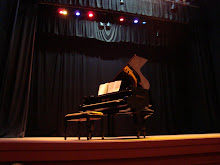

I don't think anybody can learn about Opera without hearing this name: Maria Callas. She continues to be without a doubt one of the most prominent figures in the history of this beautiful art. Born in New York in 1923 to Greek parents, George Kalogeropoulos and Evangelina Dimitriadou, She showed musical talents at a very young age and was even forced by her mother to sing all the time. Callas didn't quite enjoy it in the beginning. After her parents divorced, she moved out of New York and into Greece along with her mother and her sister. Her sister was, to put it one way, the "Marcia Brady" of the Callas family. Beautiful and slender, she was the one who was sure to find a husband and a life of her own. Maria Callas on the other hand was somewhat overweight, very clumsy and a really sensitive and insecure girl. All her mother could see in her was a voice, I can only imagine how hard this must have been for Callas.
After arriving in Athens, Greece, Callas began to develop an interest in music so she put her talents to good use. She studied music in a conservatory in Athens and her teacher was mesmerized by her extraordinary voice. Callas was said to have been an excellent student. She was a perfectionist, she nailed every note and studied every Aria syllable by syllable or even almost letter by letter. She had an amazing sight-singing technique which allowed her to easily learn many different roles in Operas.
Her career started to flourish in Italy when after singing in the most important theatres in Athens, was invited to sing in Verona. It was here where she met the man who was to be her husband for ten years: Giovanni Battista Meneghini.
Callas was off to an excellent career path, blowing everyone away with her outstanding soprano voice; The only thing that possibly bothered her at this time, with an already successful start, was her body. She was still quite overweight. Some directors and producers even complained about this, they saw a very big girl and had a hard time picturing her in certain costumes and singing alongside certain tenors.
Maria knew she had to do something. It is said that one of her inspirations to becoming later so slender, was the Belgium actress Audrey Hepburn. So, in the course of only one year, the soprano lost about 80 pounds. She became this beautiful, elegant and classy woman that many couldn't recognize her after the weight loss. Many claim this played a role in her later vocal decline, although nothing is certain. Callas also lived a very stressful life and sung a wide range of opera roles throughout most of her career. At the beginning of her career she sang Wagner and Bellini on the same week, for those of you who don't understand a lot about Opera, I mean, it's like running a marathon with a bad knee; it's extremely demanding for the voice to sing two extremely different styles of music. I urge you to download some of Wagner's Operas and then some of Bellini's, you'll hear what I'm talking about. So this I think played a bigger role in her vocal decline than her weight loss, she was constantly straining her voice.
As for her voice, many claim that it didn't have a beautiful sound. I partly agree. I think although she didn't have a beautiful timbre like let's say amazing Mirella Freni (download!), she did know exactly how to operate her voice which is not something you can say of most sopranos nowadays.
She had an exquisite precision and her musicality was just perfection, kind of like Mozart's ability to compose, Maria had the ability of sending her voice in places no other singer had taken it before. One other thing about Maria, she had an incredible natural dramatic talent. If you download some of the Arias she sang, you'll soon pick all the emotions she's constantly eroding in her singing, again another thing that you cannot say about singers today.
Having studied theatre for several years now, I can't stand it when I see how unaware opera singers are of the importance of acting or interpreting in a performance. Opera is theatre! I mean, you have a script, you have a story, characters, a scenario, costumes, lights, a beginning a middle and an end, I mean do I need to explain more?
I do acknowledge the sole importance of the music, it is definitely a priority in opera, but that should not put acting last, both should really go hand-in-hand.
If you look at some of Maria Callas' performance on You Tube, you'll see what I'm talking about. She has this uncanny ability to get into the character's skin. She feels what the character is saying and conveys it exceptionally well. This is one of the reasons she captivated her audiences, because she made them believe that she was actually going through those emotions, she told the characters' story in a very realistic way.
Unfortunately, very little attention is paid to acting in opera today. Very few singers make their stories plausible which can be one of the reasons many people think opera is boring. The audience needs to see the actor/singer affected by what's going on on stage, they need to see them react to everything that the story unravels.
So if you're still wondering why Maria Callas was so big in her time, and still is, I suggest you take a look into her bio online and see for yourself that this diva, a.k.a. La Divina, revolutionized the way of performing opera. She opened a path to many other opera singers. She invited us to really get into it and not take any single note or word for granted. Most important of all, she made opera worldly popular, she revived it.

No comments:
Post a Comment